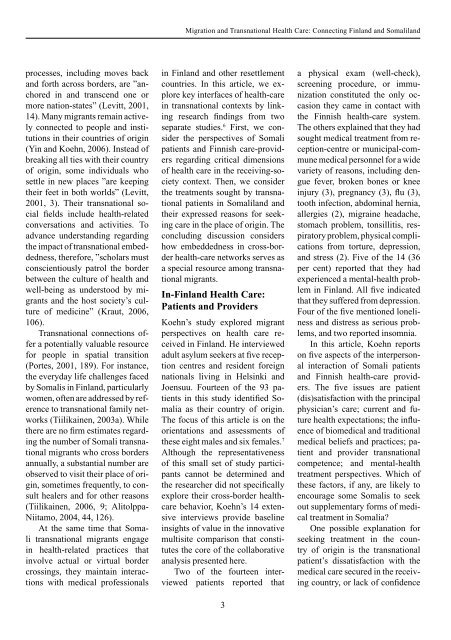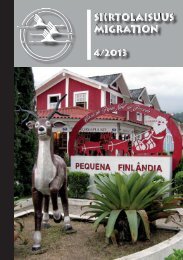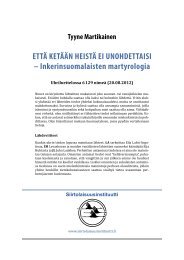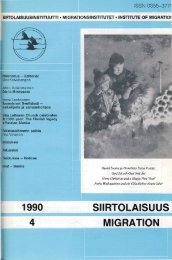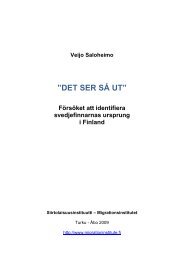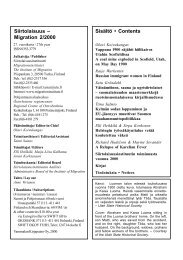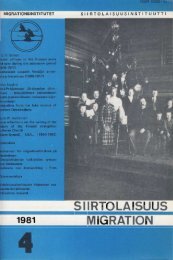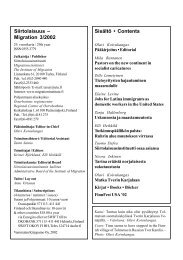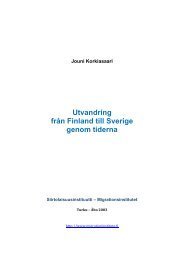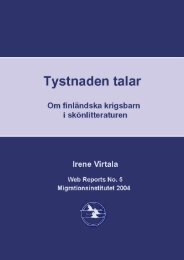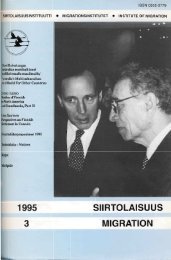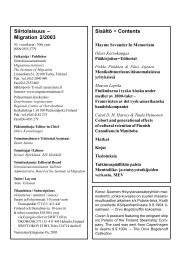2007 - 1 - Siirtolaisuusinstituutti
2007 - 1 - Siirtolaisuusinstituutti
2007 - 1 - Siirtolaisuusinstituutti
You also want an ePaper? Increase the reach of your titles
YUMPU automatically turns print PDFs into web optimized ePapers that Google loves.
processes, including moves back<br />
and forth across borders, are ”anchored<br />
in and transcend one or<br />
more nation-states” (Levitt, 2001,<br />
14). Many migrants remain actively<br />
connected to people and institutions<br />
in their countries of origin<br />
(Yin and Koehn, 2006). Instead of<br />
breaking all ties with their country<br />
of origin, some individuals who<br />
settle in new places ”are keeping<br />
their feet in both worlds” (Levitt,<br />
2001, 3). Their transnational social<br />
fi elds include health-related<br />
conversations and activities. To<br />
advance understanding regarding<br />
the impact of transnational embeddedness,<br />
therefore, ”scholars must<br />
conscientiously patrol the border<br />
between the culture of health and<br />
well-being as understood by migrants<br />
and the host society’s culture<br />
of medicine” (Kraut, 2006,<br />
106).<br />
Transnational connections offer<br />
a potentially valuable resource<br />
for people in spatial transition<br />
(Portes, 2001, 189). For instance,<br />
the everyday life challenges faced<br />
by Somalis in Finland, particularly<br />
women, often are addressed by reference<br />
to transnational family networks<br />
(Tiilikainen, 2003a). While<br />
there are no fi rm estimates regarding<br />
the number of Somali transnational<br />
migrants who cross borders<br />
annually, a substantial number are<br />
observed to visit their place of origin,<br />
sometimes frequently, to consult<br />
healers and for other reasons<br />
(Tiilikainen, 2006, 9; Alitolppa-<br />
Niitamo, 2004, 44, 126).<br />
At the same time that Somali<br />
transnational migrants engage<br />
in health-related practices that<br />
involve actual or virtual border<br />
crossings, they maintain interactions<br />
with medical professionals<br />
Migration and Transnational Health Care: Connecting Finland and Somaliland<br />
in Finland and other resettlement<br />
countries. In this article, we explore<br />
key interfaces of health-care<br />
in transnational contexts by linking<br />
research fi ndings from two<br />
separate studies. 6 First, we consider<br />
the perspectives of Somali<br />
patients and Finnish care-providers<br />
regarding critical dimensions<br />
of health care in the receiving-society<br />
context. Then, we consider<br />
the treatments sought by transnational<br />
patients in Somaliland and<br />
their expressed reasons for seeking<br />
care in the place of origin. The<br />
concluding discussion considers<br />
how embeddedness in cross-border<br />
health-care networks serves as<br />
a special resource among transnational<br />
migrants.<br />
In-Finland Health Care:<br />
Patients and Providers<br />
Koehn’s study explored migrant<br />
perspectives on health care received<br />
in Finland. He interviewed<br />
adult asylum seekers at fi ve reception<br />
centres and resident foreign<br />
nationals living in Helsinki and<br />
Joensuu. Fourteen of the 93 patients<br />
in this study identifi ed Somalia<br />
as their country of origin.<br />
The focus of this article is on the<br />
orientations and assessments of<br />
these eight males and six females. 7<br />
Although the representativeness<br />
of this small set of study participants<br />
cannot be determined and<br />
the researcher did not specifi cally<br />
explore their cross-border healthcare<br />
behavior, Koehn’s 14 extensive<br />
interviews provide baseline<br />
insights of value in the innovative<br />
multisite comparison that constitutes<br />
the core of the collaborative<br />
analysis presented here.<br />
Two of the fourteen interviewed<br />
patients reported that<br />
3<br />
a physical exam (well-check),<br />
screening procedure, or immunization<br />
constituted the only occasion<br />
they came in contact with<br />
the Finnish health-care system.<br />
The others explained that they had<br />
sought medical treatment from reception-centre<br />
or municipal-commune<br />
medical personnel for a wide<br />
variety of reasons, including dengue<br />
fever, broken bones or knee<br />
injury (3), pregnancy (3), fl u (3),<br />
tooth infection, abdominal hernia,<br />
allergies (2), migraine headache,<br />
stomach problem, tonsillitis, respiratory<br />
problem, physical complications<br />
from torture, depression,<br />
and stress (2). Five of the 14 (36<br />
per cent) reported that they had<br />
experienced a mental-health problem<br />
in Finland. All fi ve indicated<br />
that they suffered from depression.<br />
Four of the fi ve mentioned loneliness<br />
and distress as serious problems,<br />
and two reported insomnia.<br />
In this article, Koehn reports<br />
on fi ve aspects of the interpersonal<br />
interaction of Somali patients<br />
and Finnish health-care providers.<br />
The fi ve issues are patient<br />
(dis)satisfaction with the principal<br />
physician’s care; current and future<br />
health expectations; the infl uence<br />
of biomedical and traditional<br />
medical beliefs and practices; patient<br />
and provider transnational<br />
competence; and mental-health<br />
treatment perspectives. Which of<br />
these factors, if any, are likely to<br />
encourage some Somalis to seek<br />
out supplementary forms of medical<br />
treatment in Somalia?<br />
One possible explanation for<br />
seeking treatment in the country<br />
of origin is the transnational<br />
patient’s dissatisfaction with the<br />
medical care secured in the receiving<br />
country, or lack of confi dence


